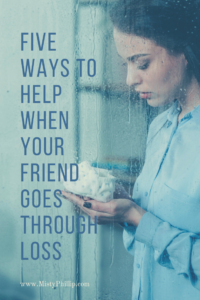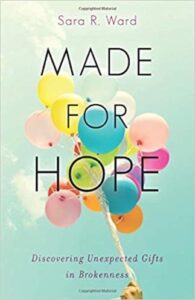There is an unspoken bond between mother’s who have buried their babies. I felt an instant connection to my guest, Sara R. Ward this week.This kind of bond can only be forged when you have walked through the Valley of the shadow of death and cling to the hope of Jesus because nothing else in life makes any sense. When you allow God to heal your wounds so you can help another grieving mother know she too will get through this loss. You begin to understand the exchange of beauty for ashes.
Please welcome Sara R Ward to By His Grace this week.
Five Ways to Help When Your Friend Goes Through Loss
by Sara R. Ward
Recently, a woman I knew lost her husband to cancer. Toward the end of his life, he was in a great deal of pain, and she didn’t want him to suffer any more.
A few months after her husband died, I talked to the woman again. The grief was in that early, raw time, and she admitted she was struggling.
“I knew grief would be hard,” she said, “but I didn’t know it would be this hard.”
I sat there in silence. This woman had been prepared. Her husband was a pastor. She knew where he was spending eternity, but her response encapsulated the grief experience: we know grief and loss are difficult, but we don’t know how hard until we experience it ourselves.
When I lost my son in 2012, I sat in a grief group with other mourners who were broken from the loss of their loved ones.
The first time I attended the support group, I dreaded even mentioning the name of my son who had passed away.
When the time came for me to introduce myself I said, “My name is Sara, and I lost my son Silas.” Even as I said it, my voice broke and the tears started falling.
Saying his name scratched open my wounded heart, but I knew these people understood. They passed the tissue box and they didn’t try to fix my grief. Finally, I had found a community who understood that it was okay to not be okay. In those support group meetings, I learned a lot about what it meant to show up for people in their heartache.

I was starting to understand why the Jews had their own tradition for grief, a process called sitting shiva for someone after they lost a loved one. For seven days after a Jewish funeral, the grief-stricken family sits together and mourns. No work is done. The friends who visit during a shiva call come in quietly.
Tradition says the usual small talk is usually replaced by silence or allowing the mourner to open the conversation. Their job is to be present, to sit in the quiet, or listen to the mourners.
The tradition of sitting shiva is a good example of how we can provide help. You can’t fix the grief, but you can show up and make yourself available. Choosing to be present in grief is an incredible gift. Click To Tweet
If you’re looking for other ways you can help, choose something that makes life easier for the family who has suffered loss. Food is an obvious choice, but there are other tasks that can be just as helpful.
One neighbor offered to do our laundry after Silas died. At first, I balked at the idea of passing on our dirty clothes. But she wanted to bless us this way and I knew I needed help. It was just so hard to accept it.
“You take away someone’s blessing when you reject help,” a friend once told us. “Because it blesses them as much as it does you.”
When the neighbor returned, laundry folded in neat piles, a wave of relief washed over me. She had blessed me with a simple act, and in return, doing this kindness gave her something in return.
We all need community, but it’s especially vital when our world crumbles. When our community shows up and offers what they can to ease the burden, it gives us a sense that we are not alone.
Together, we will get through this.
Ways you can help a friend in need:
- Show up. Be present and available. Don’t shrink from the hard stuff.
- Offer to take something off their plate: cooking, cleaning, laundry, lawn mowing, childcare, The list is endless. If you can’t do it yourself, send a gift card covering the expense if possible. Make life easier for them in some small way.
- Don’t show up only during the week of a major event, but continue to reach out months afterward when the phone calls stop.
- Pray for them regularly. This may be the most overlooked act and yet, one of the most important.
- Affirm what they are feeling. Listening is one of the greatest gifts you can offer to a friend going through heartache.
About the author
Sara R. Ward is the author of the book, Made for Hope: Discovering Unexpected Gifts in Brokenness. She is a wife and mom to three children, including a son who passed away from Leigh’s disease in 2012. She writes about grief, child loss, adoption, and faith on sararward.com. She is a writer for adoption.com and has been published on the Today Show Parenting Team, Focus on the Family and Homeschooling Today.

Receive free grief resources at sararward.com
Facebook: @sararwardauthor
Instagram, Twitter and Pinterest: @sararward
For more encouragement please listen to my conversation with Sara and share it with it with a friend.You
Thanks so much for visiting today! You may also like Choosing Joy in Grief and From Grief to Grace.
Much love,


Recent Comments